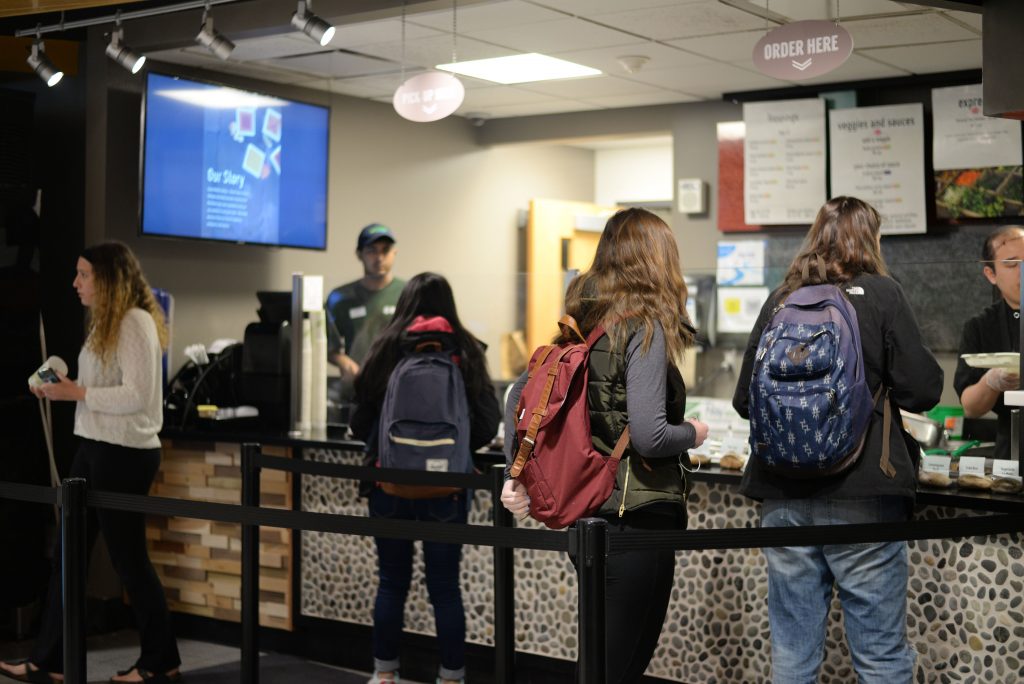
Binghamton University Dining Services, operated by Sodexo, is subjected to regular health inspections by the New York State Department of Health (DOH).
During the last inspection of the Marketplace, which took place on April 5, 2016, five violations were found. One of the violations was labeled as a critical violation, meaning that the violation relates directly to factors that could lead to foodborne illness.
The source of the violation, according to a Food Service Establishment Inspection Report, was Mein Bowl. According to the report, the Asian-fusion dining spot stored both chicken and beef at temperatures lower than called for by safety guidelines.
“Cooked chicken thighs found in hot hold at Mein Bowl at 125-130°F,” reads the report. “Cooked beef at 112-120°F, reheated to 165°F then hot hold at no less than 140°F.”
The minimum required temperature for “hot holding,” or storing after cooking, is 140 degrees, meaning that beef found at Mein Bowl was nearly 30 degrees colder than the DOH’s required temperature.
According to Thomas LaSarso, director of retail operations at Binghamton University Sodexo, the company took immediate action to remedy the situation at Mein Bowl.
“During the course of a random, unannounced inspection, hundreds of hot and cold foods in the Marketplace were tested for proper cooking temperatures as well as proper holding requirements,” LaSarso wrote in an email. “Unfortunately, one item, chicken at the Mein Bowl outlet, was found to be held at a temperature lower than recommended. Immediate response was taken by Dining Services team in accordance with the inspector which included the product being removed from service.”
He emphasized that Sodexo remains committed to food safety.
“Binghamton University Dining Services considers food safety to be a top priority,” LaSarso wrote. “We strive to provide safe, quality foods at all our venues.”
Mein Bowl, like Tully’s and Moghul, is an independently operated sub-contractor of Sodexo, which means that the day-to-day operations are overseen by Mein Bowl management.
Other violations recorded at the Marketplace were minor in nature and not considered direct risks to food safety. These include missing thermometers in several locations, employees found eating in the store room and severely damaged deep fryer baskets at both Mein Bowl and Pandini’s.
According to the DOH, high-risk facilities like school kitchens are generally inspected twice per year and each inspection lasts anywhere from 30 minutes to two hours.
On campus, each dining area is treated as its own food service establishment and is thus individually inspected. In addition to the Marketplace, the Events Center, Chenango Room and each residential dining hall are all inspected.
Among the resident dining halls, Appalachian Dining Hall in Mountainview Community has fared the worst. Between its last two inspections on September 28, 2015 and April 14, 2016, the eatery has racked up a total of 17 violations, one of which was labeled as a critical violation.
The critical violation found during the April 2016 inspection was for a roasted garden vegetable soup found at 130 degrees just after being put out, ten degrees colder than the DOH’s minimum safe temperature.
The only facility on campus with zero health violations in the last year was John Arthur Café, which is also the only permanent food service facility on campus not run by Sodexo.


